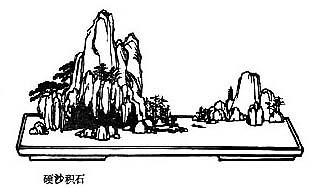孫
子
兵
法
Sun Zi 
 – The Art of War
– The Art of War
Chinese strategy explained : know yourself and the ennemy, use deception, spies, and "win with ease". Tr. Giles (en, annotated) and Amiot (fr).
Variation In Tactics
The heading means literally "The Nine Variations," but as Sun Tzu does not appear to enumerate these, and as, indeed, he has already told us (V SS. 6-11) that such deflections from the ordinary course are practically innumerable, we have little option but to follow Wang Hsi, who says that "Nine" stands for an indefinitely large number. "All it means is that in warfare we ought to very our tactics to the utmost degree... I do not know what Ts`ao Kung makes these Nine Variations out to be, but it has been suggested that they are connected with the Nine Situations" - of chapt. XI. This is the view adopted by Chang Yu. The only other alternative is to suppose that something has been lost–a supposition to which the unusual shortness of the chapter lends some weight.
Sunzi VIII. 3.
There are roads which must not be followed,1 armies which must be not attacked,2 towns which must not be besieged,3 positions which must not be contested, commands of the sovereign which must not be obeyed.4
Giles VIII.3.
V. Si, par hasard ou par votre faute, votre armée se rencontrait dans des lieux plein de défilés, où l'on pourrait aisément vous tendre des embûches, d'où il ne serait pas aisé de vous sauver en cas de poursuite, où l'on pourrait vous couper les vivres et les chemins, gardez-vous bien d'y attaquer l'ennemi ; mais si l'ennemi vous y attaque, combattez jusqu'à la mort. Ne vous contentez pas de quelque petit avantage ou d'une demi victoire ; ce pourrait être une amorce pour vous défaire entièrement. Soyez même sur vos gardes, après que vous aurez eu toutes les apparences d'une victoire complète.
VI. Quand vous saurez qu'une ville, quelque petite qu'elle soit, est bien fortifiée et abondamment pourvue de munitions de guerre et de bouche, gardez-vous bien d'en aller faire le siège. Si vous n'êtes instruit de l'état où elle se trouve qu'après que le siège en aura été ouvert, ne vous obstinez pas à vouloir le continuer, vous courrez le risque de voir toutes vos forces échouer contre cette place, que vous serez enfin contraint d'abandonner honteusement.
VII. Ne négligez pas de courir après un petit avantage lorsque vous pourrez vous le procurer sûrement et sans aucune perte de votre part. Plusieurs de ces petits avantages qu'on pourrait acquérir et qu'on néglige occasionnent souvent de grandes pertes et des dommages irréparables.
VIII. Avant de songer à vous procurer quelque avantage, comparez-le avec le travail, la peine, les dépenses et les pertes d'hommes et de munitions qu'il pourra vous occasionner. Sachez à peu près si vous pourrez le conserver aisément ; après cela, vous vous déterminerez à le prendre ou à le laisser suivant les lois d'une saine prudence.
IX. Dans les occasions où il faudra prendre promptement son parti, n'allez pas vouloir attendre les ordres du prince. S'il est des cas où il faille agir contre des ordres reçus, n'hésitez pas, agissez sans crainte. La première et principale intention de celui qui vous met à la tête de ses troupes est que vous soyez vainqueur des ennemis. S'il avait prévu la circonstance où vous vous trouvez, il vous aurait dicté lui-même la conduite que vous voulez tenir. Voilà ce que j'appelle les neuf changements ou les neuf circonstances principales qui doivent vous engager à changer la contenance ou la position de votre armée, à changer de situation, à aller ou à revenir, à attaquer ou à vous défendre, à agir ou à vous tenir en repos. Un bon général ne doit jamais dire : Quoi qu'il arrive, je ferai telle chose, j'irai là, j'attaquerai l'ennemi, j'assiégerai telle place. La circonstance seule doit le déterminer ; il ne doit pas s'en tenir à un système général, ni à une manière unique de gouverner. Chaque jour, chaque occasion, chaque circonstance demande une application particulière des mêmes principes. Les principes sont bons en eux-mêmes ; mais l'application qu'on en fait les rend souvent mauvais.
Amiot

The Art of War – Sun Zi VIII. 3. – Chinese on/off – Français/English
Alias Sun Tzu, Sun Wu, Sun Tse, Sunzi Bingfa, Souen Tseu, Souen Wou, 孫武.
The Book of Odes, The Analects, Great Learning, Doctrine of the Mean, Three-characters book, The Book of Changes, The Way and its Power, 300 Tang Poems, The Art of War, Thirty-Six Strategies
Welcome, help, notes, introduction, table.
Index – Contact – Top
